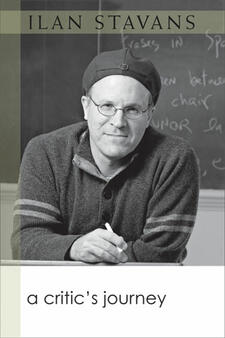Q&A with Ilan Stavans, author of A Critic's Journey

Ilan Stavans has been a lightning rod for cultural discussion and criticism his entire career. In A Critic's Journey, he takes on his own Jewish and Hispanic upbringing with an autobiographical focus and his typical flair with words, exploring the relationship between the two cultures from his own and also others' experiences.
Stavans has been hailed as a voice for Latino culture thanks to his Hispanic upbringing, but as a Jew and a Caucasian, he's also an outsider to that culture ---something that's sharpened his perspective (and some of his critics' swords). In this book of essays, he looks at the creative process from that point of view, exploring everything from the translation of Don Quixote to the Hispanic anti-Semitism and the Holocaust in Latin America.
Ilan Stavans is Lewis-Sebring Professor in Latin American and Latino Culture and Five College Fortieth Anniversary Professor at Amherst College. He has written and edited numerous books and the award-winning movie My Mexican Shivah was based on one of his stories.
The University of Michigan Press: How do you define yourself: Latino, Jewish, or American? Or do you define yourself as all?
Ilan Stavans: These categories aren't mutually exclusive. I'm each and every one, depending on the circumstance. Identity is a house of mirrors: our features change depending on the perspective.
UMP: In "Who Owns the English Language?" you talk about the way English has spread across the globe. What opportunities---and disadvantages---has that spread brought us?
IS: English is astonishingly elastic. It travels around lending and borrowing without much concern. As a result, its boundaries are constantly being reshaped. In the essay you mention, I discuss what is to me a fascinating dichotomy: while Shakespeare's tongue is today the lingua franca of tourism, business, and scholarship everywhere, and thus is an imperial tongue, in the United States it exists in a constant state of rapture. In the last decade I've devoted myself to an emerging modality: Spanglish. When I first arrived as an immigrant, this hybrid form of communication existed in the fringes of cultures whereas nowadays it occupies a central place, defining the rhythms of standard English in myriad ways, quantifiable and not.
UMP: In "Betraying Latino Students," you discuss the abysmal enrollment by Latino students in prestigious colleges. What steps could be taken to start correcting that problem?
IS: A number of different steps could be taken. First, it is crucial that we see Latinos as an integral element in American society and not as a marginal group from which the Admission's office needs to find a quota. Second, Latino culture needs to become an integral part of the curriculum and not be presented as exotic. Third, Spanish no longer should be taught as a foreign language on campus, since its roots in the United States are deep and multifaceted. Fourth, Latinos should not only be represented in substantial numbers at the student level, but (also) in the administration, especially in leadership roles. In no way am I calling for Latinos to be given any special treatment: they must deserve their place in the classroom and anywhere in the university space.
UMP: Very little is taught in mainstream classes about the impact of the Holocaust on Latin America. What makes those countries unique in terms of the results of the war? How have they been affected by it?
IS: The Holocaust played a heterogeneous role in Latin America. That role goes from the political and military participations of nations in the war itself to the refugees, survivors, and former Nazis that sought a safe haven in them. From Argentina to the Dominican Republic, there is much that needs to be done in scholarly terms in this area. Spain during World War II has been an eclipsed area of study. Furthermore, it is time for us to start understanding Hispanic anti-Semitism in its own terms: what are its motivations and how are those motivations based on Hispanic idiosyncrasy? How has that anti-Semitism changed from 1492 to World War II and onward to the creation of the state of Israel in 1948?
UMP: Your essay, "Don Quixote at 400," describes the circumstances of the great knight's tale. What impact has that work had on society, in your view?
IS: Not only is Don Quixote the most translated Spanish-language novel, but it has been a consistent international best-seller for four hundred years. Indeed, some suggest that after the Bible, no single book is read more often, or misread, I should say, since the adventures of the sorrowful knight is the type of classic people own but never read. Still, its impact is enormous. Our understanding of individual freedom, democracy, tolerance, pluralism, and mental illness in Western Civilization are all intimately linked to Cervantes' marvelous novel. I dream one day of writing a short personal book on that impact.
To read more about A Critic's Journey, visit the University of Michigan Press website at: /isbn/9780472033829
For more University of Michigan Press podcasts, visit:www.press.umich.edu/podcasts/



